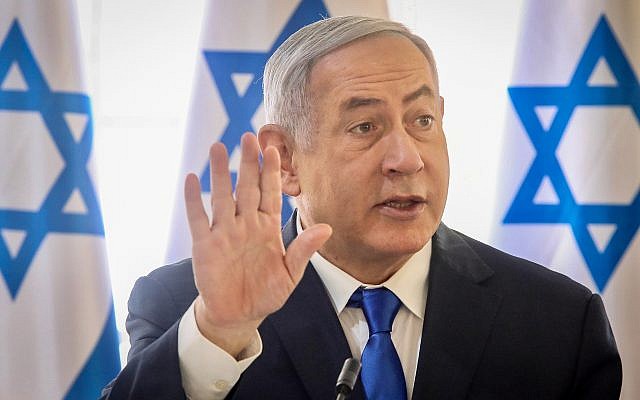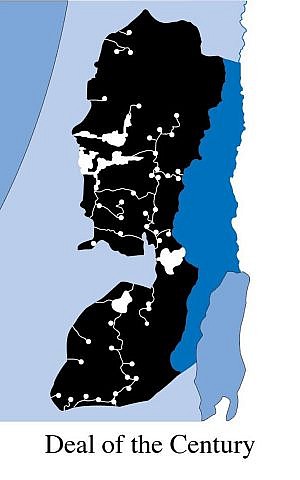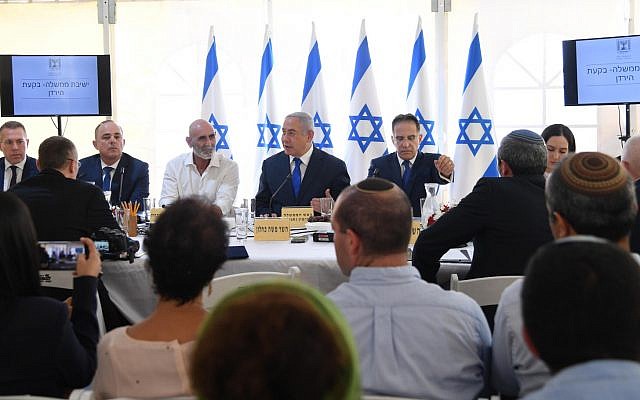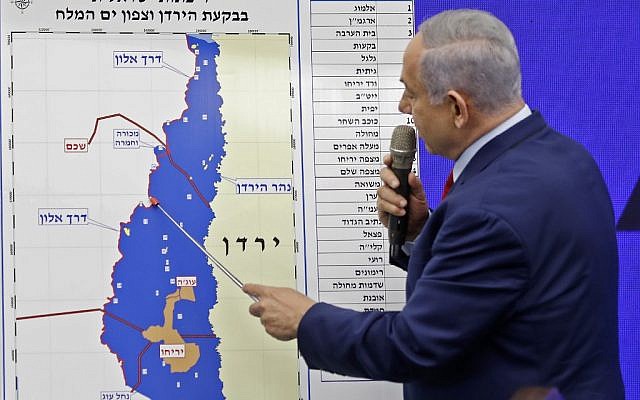Prime minister says all moves to be done in coordination with President Trump and argues, in election pitch, that he is only one capable of negotiating with US leader

Prime Minister Benjamin Netanyahu said Sunday that if reelected he plans to annex “vital” parts of the West Bank beyond the Jordan Valley and the major settlement blocs, and do so in coordination with the United States.
Netanyahu, who is campaigning ahead of Tuesday’s election, appeared to go even further than his pledge last week to extend Israeli sovereignty over the Jordan Valley and the anticipation that the large settlement blocs would remain under Israeli rule in any future peace deal.
Speaking to Army Radio, Netanyahu also spoke of Israeli taking “vital areas” outside the blocs, but did not elaborate. He also spoke of consecutive annexations as a process that was being pushed along with the Trump administration.

In the interview Netanyahu was asked about a map published earlier in the day by right-wing Yamina candidate Naftali Bennett, that he claimed was the long-delayed Trump peace plan’s scheme for dividing the West Bank between Israel and the Palestinians. His party later acknowledged it had “compiled” the map itself based on various reports.
The alleged plan, shared by Bennett on Facebook together with a map, shows what he calls “islands” of Israeli control surrounded by a majority of the West Bank set aside for a Palestinian state.
Netanyahu called that map “fake news,” but acknowledged, he doesn not have his own map as he was waiting for the release of the Trump plan after the elections.
“The question of who will ensure the future of Jewish settlement is clear,” Netanyahu said. “Who will be able to negotiate with President Trump? The other (candidates) won’t be able to stand against US pressure,” he said noting how he withstood “immense pressure” from the Clinton and Obama administrations to halt settlement construction.
“This is a historic opportunity, because after the epic holding battle I led against pressures to return to the 67 lines, I am now turning the direction of our history,” Netanyahu vowed. ” Instead of withdrawals, evacuations and concessions, we are now turning toward recognition and rights.”
Netanyahu has had his call to annex the Jordan Valley panned as an election ploy, with critics saying he could have done it at any time in recent years if he really wanted to.
But the prime minister said the timing was part of a process.
“There are stages that have to happen,” Netanyahu said. “I caused them (the Trump administration) to recognize Jerusalem as the capital of Israel, after that to move the embassy there and then recognize our sovereignty over the Golan Heights.”
“And now after immense diplomatic efforts, I am laying the groundwork toward recognizing Israeli sovereignty over the Jordan Valley as our eastern defensive wall, and after, over all the settlements and other vital areas, those in the (settlement) blocs and those outside,” Netanyahu said. “And all that, I want to do together with President Trump.”

“This will finally determine our eastern border,” Netanyahu said. “There is no map, I’m waiting for President Trump after the elections.”
His comments come after the cabinet approved a proposal on Sunday to begin legalizing a wildcat outpost in the Jordan Valley after Attorney General Avichai Mandelblit rescinded his opposition to the plan.
Mandelblit had initially argued that the plan was being advanced by Prime Minister Benjamin Netanyahu out of “electoral considerations.”
Shortly before the vote to begin legalizing Mevo’ot Yeriho, the cabinet meeting paused for Mandelblit to hold a last-minute consultation with Netanyahu and national security adviser Meir Ben Shabbat.
During that conversation, Mandelblit was made privy to “recent developments in policy along with the prime minister’s and national security adviser’s assessment that there is urgency in the decision to establish the settlement by the government at this time,” a statement from the attorney general’s office said, without specifying what that information was.

A source with knowledge of their conversation said Netanyahu told the attorney general that Trump’s peace plan will likely put such outposts at risk for evacuation and that the government must act immediately to legalize Mevo’ot Yeriho and “combat” the plan before it is introduced, ostensibly shortly after Tuesday’s election.
Mandelblit subsequently agreed to rescind his opposition to the proposal. On Thursday, the attorney general issued a legal opinion saying that it had been drawn up based on “electoral considerations” and that while the government has a right to advance decisions to strengthen Israeli settlement in the West Bank, “during an election period, the outgoing government is obliged to act with restraint when it comes to the decisions taken and the allocation of resources.”
While the international community considers all settlement activity illegal, Israel differentiates between legal settlement homes built and permitted by the Defense Ministry on land owned by the state and illegal outposts built without permits, often on private Palestinian land.
Separately, during the cabinet meeting Netanyahu updated ministers on his appointment of a team led by Prime Minister’s Office director Ronen Peretz that will be responsible for formulating the plan to annex the Jordan Valley.

Netanyahu said his plan to apply Israeli sovereignty over all West Bank settlements will “come up” as part of the upcoming US peace initiative.
Netanyahu’s annexation plans have sparked a cascade of international condemnations. Critics say it could inflame the Middle East and eliminate any remaining Palestinian hope of establishing a state.
As reported by The Times of Israel
